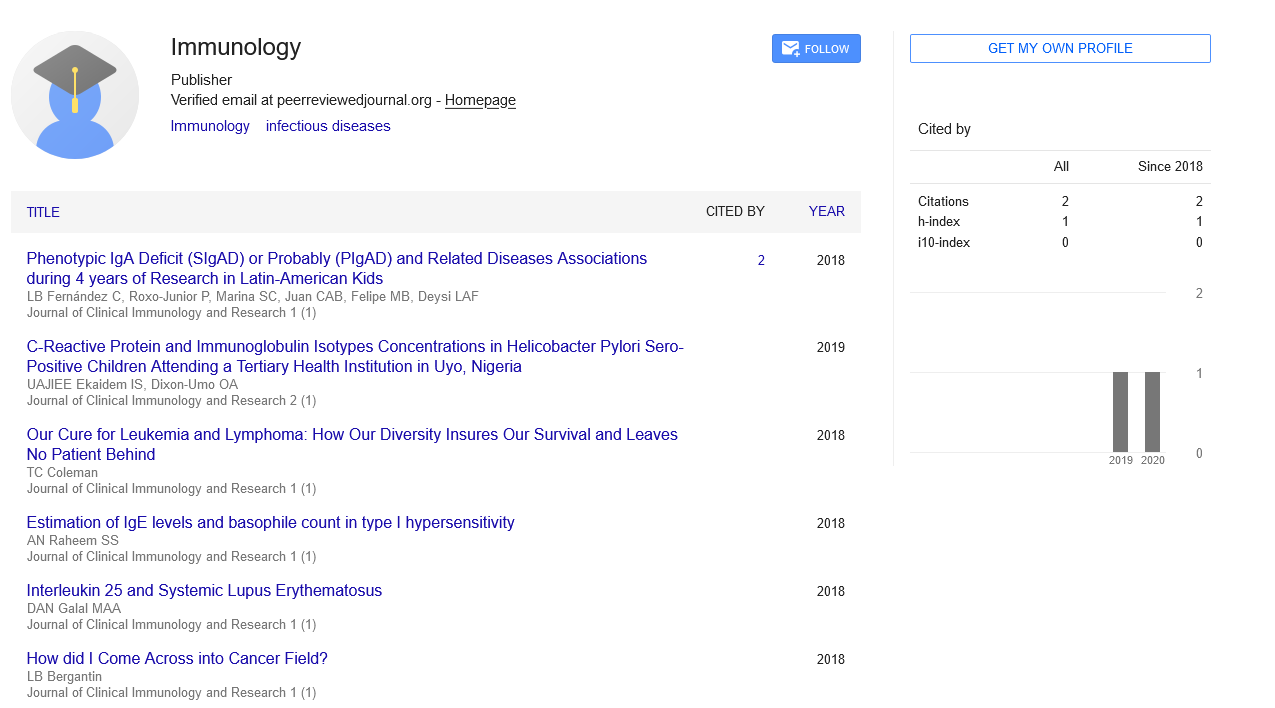Perspective, J Clin Immunol Res Vol: 6 Issue: 3
Precision Medicine in Rheumatology: Integrating Genomics and Immune Profiling
Gui Zuog*
1Department of General Practice, Zhejiang University, Hangzhou, China
*Corresponding Author: Gui Zuog,
Department of General Practice, Zhejiang
University, Hangzhou, China
E-mail: zuoggui0@gmail.com
Received date: 02 September, 2023, Manuscript No. JCIR-23-116295;
Editor assigned date: 04 September, 2023, PreQC No. JCIR-23-116295 (PQ);
Reviewed date: 18 September, 2023, QC No. JCIR-23-116295;
Revised date: 25 September, 2023, Manuscript No. JCIR-23-116295 (R);
Published date: 05 October, 2023, DOI: 10.4172/JCIR.100088.
Citation: Zuog G (2023) Precision Medicine in Rheumatology: Integrating Genomics and Immune Profiling. J Clin Immunol Res 6:3.
Abstract
Description
Rheumatological diseases encompass a diverse group of conditions characterized by immune dysregulation. Precision medicine, tailored to individual patient profiles, has gained traction in rheumatology. The emerging field of precision medicine in rheumatology, emphasizing the integration of genomics and immune profiling to enhance disease understanding, prognosis, and treatment.
Rheumatological diseases, such as Rheumatoid Arthritis (RA), Systemic Lupus Erythematosus (SLE), and Psoriatic Arthritis (PsA), represent a heterogeneous group of autoimmune disorders characterized by immune system dysfunction. The advent of precision medicine, which customizes medical care to individual patient profiles, has the potential to transform the management of these complex conditions.
Precision medicine
Precision medicine seeks to identify unique patient characteristics, including genetic, molecular, and clinical factors, to optimize disease management. In rheumatology, this approach aims to achieve more accurate diagnoses, predict disease progression, and select targeted treatments.
Genetic susceptibility: Numerous rheumatological diseases have a hereditary component. Genetic studies have identified susceptibility genes associated with conditions like RA, SLE, and Ankylosing Spondylitis (AS). Understanding these genetic factors can inform risk assessment and early intervention strategies.
Pharmacogenomics: Genomic variants influence drug responses in rheumatology. Pharmacogenomic studies provide insights into individual patient's drug metabolism and response profiles, enabling personalized treatment selection and dosing.
Immune profiling: Immune profiling involves the comprehensive analysis of immune cell subsets, cytokine profiles, and immune cell functions in rheumatological patients. This approach can provide valuable insights into disease mechanisms and individual patient immune status.
Characterizing immune dysregulation: Immune profiling allows the identification of specific immune cell abnormalities in patients with rheumatological diseases. Aberrant T cell subsets, B cell function, and cytokine imbalances are often observed and can guide treatment decisions.
Monitoring disease activity: Immune profiling can serve as a biomarker for disease activity. Monitoring changes in immune cell populations and cytokine profiles can help assess the effectiveness of treatments and guide therapeutic adjustments.
Data interpretation: The interpretation of complex genomic data and immune profiles requires specialized expertise and analytical tools.
Standardization: The lack of standardized protocols for immune profiling can lead to variability in results across laboratories.
Ethical considerations: Handling genetic and immune data raises ethical concerns, including patient privacy and informed consent.
Early diagnosis: Genomic markers and immune profiling can aid in the early diagnosis of rheumatological diseases, enabling timely interventions to prevent disease progression.
Predicting disease progression: Integrating genetic and immune data allows for the identification of patients at high risk of severe disease, facilitating proactive management strategies.
Targeted therapies: Precision medicine enables the selection of targeted therapies tailored to an individual's genetic and immune profile, increasing treatment efficacy and minimizing side effects.
Conclusion
Precision medicine in rheumatology is rapidly evolving, driven by advances in genomics and immune profiling technologies. The field holds results for improving diagnosis, prognosis, and treatment outcomes for patients with rheumatological diseases. Combining genomic, transcriptomic, proteomic, and metabolomic data for a comprehensive understanding of disease pathogenesis. Developing refined patient stratification algorithms based on multiple data modalities. Creating personalized treatment algorithms that consider genetic and immune profiles. Encouraging data sharing and international collaboration to accelerate research and standardize practices. In conclusion, precision medicine is poised to revolutionize rheumatology by tailoring treatments to the unique characteristics of individual patients. Integrating genomics and immune profiling offers new avenues for understanding and managing rheumatological diseases, ultimately improving patient care and outcomes.
 Spanish
Spanish  Chinese
Chinese  Russian
Russian  German
German  French
French  Japanese
Japanese  Portuguese
Portuguese  Hindi
Hindi 